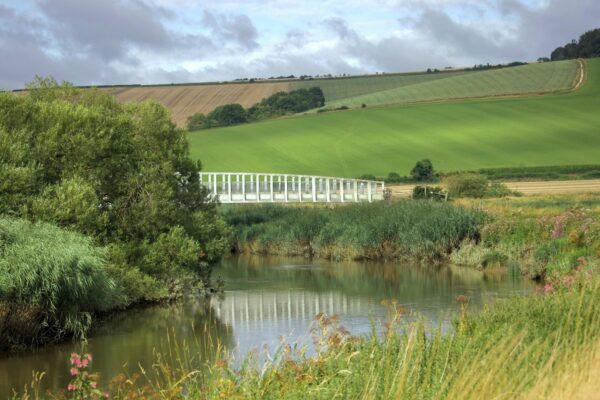Private sector funding for English nature recovery projects took a major step forward today with Lloyds Banking Group becoming the first organisation to provide funding through the government-developed Projects for Nature platform.
Projects for Nature (PFN) aims to connect businesses and other donors with 25 English quality nature projects, to help close the nature finance gap and recover the health of our planet. PFN is an online platform, which matches corporate donations to nature recovery projects, screened by Defra, Natural England and Environment Agency to ensure projects align with the government’s Environmental Improvement Plan.
Credit: Stephen Noulton
Launched at COP28 by the Secretary of State, the initiative established a pioneering partnership with the Council for Sustainable Business, Crowdfunder, and Accenture – bringing together government, expert bodies, NGOs, businesses, and the public to fund nature. A portfolio of 25 projects have been selected for the first phase, with diversity in scale, desired outcomes, and geographic spread across England—as well as a variety of societal benefits. All businesses on the platform are screened to confirm they are already taking action to avoid and reduce their own environmental impacts, as a prerequisite for their funding of Projects for Nature. Projects on the platform cannot be used as offsets.
Following from the investment of £2 million from SSEN resulting in the largest-ever Scottish seagrass planting programme being launched, the three projects receiving the £250,000 funding from Lloyds Banking Group through Projects for Nature are:
- Weald to Waves: Creating a 100-mile nature recovery corridor in Sussex, connecting over 20,000ha of habitats along 3 main rivers to the coast. This project aims to enhance biodiversity, reduce flooding, capture carbon, and boost the rural economy.
- Resilient Glenderamackin: This Cumbrian catchment-based project aims to reduce flood risk, restore nature, and combat climate change. Led by the West Cumbria Rivers Trust, it involves over 40 farmers and land managers in designing natural flood management interventions across 11,000 ha.
- Peak District – Nature Recovery at Dalehead: The National Trust, alongside partners and tenant farmers in the High Peak, will restore 2.6km of wetland between Mam Tor and Kinder Scout. The funding will also support the expansion of the Peak Regenerative Farmers initiative, promoting nature-friendly farming practices alongside sustainable food production.
The projects are designed to address national nature recovery priorities and assist to secure wider societal benefits for Britain’s communities.
Lloyds Banking Group will also be able to gather learnings about both the commercial risk management and environmental benefits of nature-based solutions, including flood risk management and regenerative agriculture to support the Group’s long-term nature strategy and its own biodiversity gain with customers and clients.
Green Finance Minister Lord Benyon, speaking at the Natural Capital Conference, said:
“Under the Green Finance Strategy and Nature Markets Framework this Government set out the vision for scaling up private investment into nature recovery, and today’s update sets out our aim to make nature markets bigger and better through robust market rules and infrastructure.”
Projects for Nature is a key component of the government’s strategy to attract private funding for environmental conservation. The Nature Markets Framework introduced a year ago, outlines plans to increase private investment in nature recovery and sustainable farming. An update on progress highlights efforts to bridge the nature funding gap in England by fostering efficient and trustworthy nature markets.
The British Standards Institution (BSI) will release the first Overarching Principles Standard, part of a series aimed at ensuring transparency and integrity in nature investment. This initiative, under the BSI Nature Investment Standards Programme, involves collaboration between Defra, businesses, and environmental stakeholders. These measures align with the government’s target to raise annual private investment in nature to £500 million by 2027 and over £1 billion by 2030.
Read more here.
